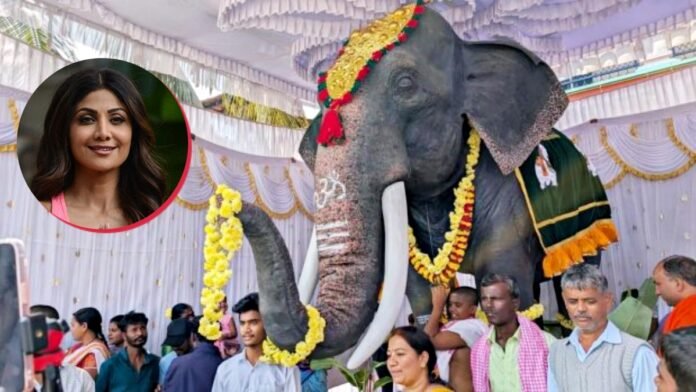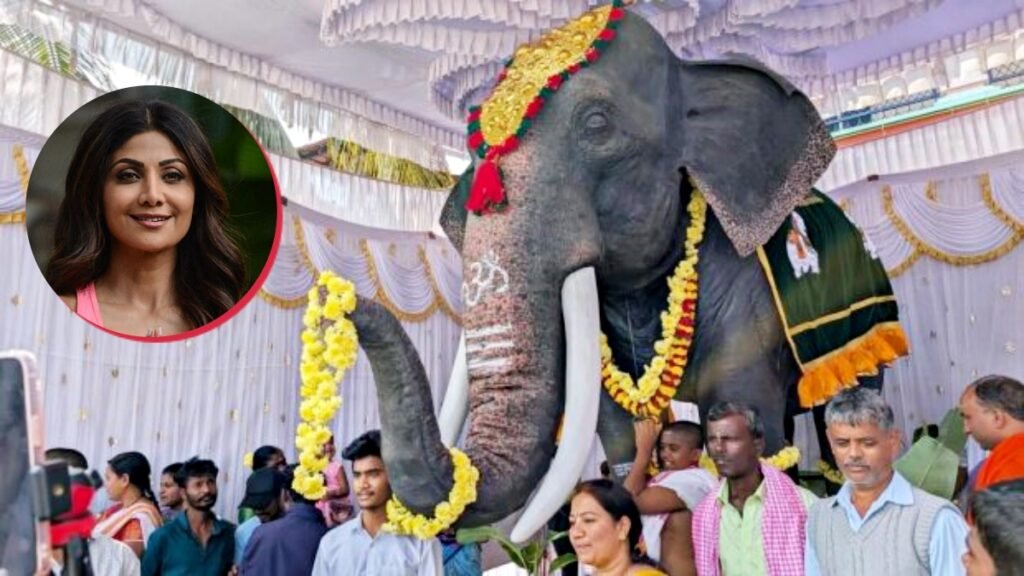
Key Highlights:
- Innovative Technology for Temples: Actress Shilpa Shetty donates an 800 kg mechanical elephant to Sri Jagadguru Renukacharya Temple, promoting cruelty-free rituals.
- Pioneering Move: The temple becomes the first in Karnataka’s Chikmagalur district to embrace robotic technology for ceremonial purposes.
- Wildlife Protection Advocated: The initiative aligns with the Wildlife Protection Act, 1972, which prohibits the donation of live elephants.
- Support from PETA and CUPA: NGOs, including PETA India and CUPA, play a pivotal role in developing and donating these lifelike mechanical elephants.
- Broader Impact: Encouragement for other temples to adopt mechanical elephants, reducing exploitation of live animals.
Bengaluru: In a landmark event advocating animal welfare, Bollywood actress Shilpa Shetty donated a mechanical elephant named Veerabhadra to the Sri Jagadguru Renukacharya Temple at Rambhapuri Peetha in Karnataka. The gesture marked the centenary birth anniversary of Srimad Rambhapuri Veerarudramuni Jagadguru and was celebrated with an official launch by Karnataka Forest Minister Ishwar B. Khandre on Sunday.
Technology Meets Tradition
The temple, located in Karnataka’s Chikmagalur district, is the first in the region to adopt robotic technology for rituals. The 800-kg mechanical elephant, standing at three meters tall, is crafted from rubber, fibre, metal, mesh, foam, and steel and operates with five motors.
This innovation enables the temple to conduct traditional ceremonies without involving live elephants, thus promoting cruelty-free practices. The move underscores the temple’s commitment to the welfare of animals, with the management pledging never to keep or rent live elephants.
A Collaborative Effort
The mechanical elephant was donated through a joint effort by PETA India and Bengaluru-based NGO Compassion Unlimited Plus Action (CUPA). Speaking at the event, Minister Ishwar Khandre expressed gratitude to Shilpa Shetty and the NGOs, emphasizing the importance of protecting the rights of elephants to live freely in the wild.
The temple’s chief, Swami Rambhapuri Jagadguru, lauded the initiative, urging other temples to adopt similar cruelty-free practices.
The Need for Change
According to PETA India, elephants used in captivity often suffer from severe injuries due to prolonged chaining, leading to stress, frustration, and aggression. These conditions have resulted in numerous tragic incidents. Citing a report by the Heritage Animal Task Force, PETA revealed that captive elephants in Kerala alone were responsible for 526 human fatalities over a 15-year period.
By adopting mechanical alternatives, temples can help reduce the exploitation of live elephants, allowing these majestic creatures to remain in their natural habitats with their herds.
Wider Adoption Across South India
This is not the first instance of temples adopting robotic elephants. Actress Parvathy Thiruvothu previously donated a mechanical elephant to the Irinjadappilly Sri Krishna Temple in Thrissur, Kerala. Currently, at least 10 mechanical elephants are being used in temples across South India, six of which were donated by PETA India with contributions from animal welfare advocates.

A Call for Nationwide Change
The donation of Veerabhadra marks a significant shift in how temples across India approach traditional rituals involving elephants. It sets a precedent for balancing cultural traditions with modern values of compassion and animal welfare.
Through initiatives like these, Shilpa Shetty, PETA India, and CUPA are paving the way for a more humane future, ensuring that sacred traditions honor both faith and the natural world.



















































